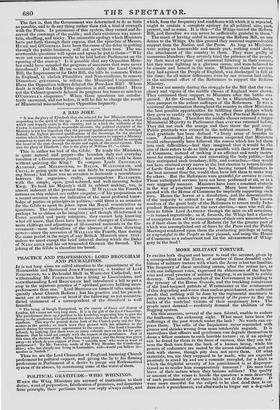POLITICAL GRATITUDE—WHIG WHININGS.
WHEN the Whig Ministers are accused of inattention to their duties, want of preparation, falsification of promises, and departure from principle, their partisans have one reply always ready, and which, from the frequency and confidence with which it is repeated, ought to contain a complete apology for all political sins, past, present, and to come. It is this---" the Whigs carried the Reform
Bill, and therefore we can never be sufficiently grateful to them." The merit of having aided in carrying the Reform Bill, no one denies to the Whigs. On this ground they received unprecedented
support from the Nation and the Press. As long as Ministers were acting an honourable and manly part, nothing could shake the attachment of the country to them. They were guilty of numerous blunders; they severely tried the patience of the people, by their want of vigour and occasional faltering in their course; but they were fighting in a glorious cause, and were believed to be sincere and honest in the main. Whatever claim for services they had against the People of England, was discharged in full at the time; for all minor differences were by one consent laid aside, in the universal effort of the Reformers to support the Reform Ministry. It was not merely during the struggle for the Bill that the con- stancy and vigour of the middle classes of England were shown. They continued their support to Ministers after the battle was gained. At the General Election, to be a Ministerialist, was a sure passport to the ardent suffrages of the Reformers. It was a universal determination throughout the country to allow Ministers the best possible opportunities for fulfilling those pledges which they gave so readily in Opposition, to effect Practical Reforms in Church and State. Therefore the middle classes returned a larger Ministerial Majority to Parliament than ever was returned before. They did not suck the orange and then throw the peel away. Public gratitude was evinced in the noblest manner. But poli- tical gratitude has been defined "a lively sense of benefits to come." Assuredly, had the Reformers suspected that Ministers would subsequently have followed the course which has led them into such difficulties,—had they imagined that it would be the aim of their rulers to do as little as possible with their new House of Commons, instead of making it an efficient and ready instru- ment for removing abuses and renovating the body politic,—had they anticipated such treachery, folly, and cowardice,—they would not have strained every nerve at the last election to return friends of Lords GREY and ALTHORP; but, having turned Ministers to the best account thus far, would then have left them to make way for others. But the Reformers were grateful for services to come. Those anticipated services have not been performed at all, or in a very niggardly manner. Ministers have been a constant obstacle in the way of practical improvement. Many have become dis- gusted with the House of Commons for implicitly supporting such men. Hence the horror at a dissolution, and the determination of the majority to submit to any thing but that. The known resolves of the great body of the Reformers to return really Inde- pendent Representatives at the next election,—men who will dis- dain to follow Lord ALTHORP through the mire on all occasions, —is termed ingratitude; as if, forsooth, the Whigs had a charter of exemption from all the consequences of their own misconduct,— as if their share in the work of Reform (by far the greater part of which was accomplished out of doors by the Press and the Public Meetings) conferred upon them the everlasting privilege of being as ungrateful to the People as they pleased, and using the House of Commons as a subservient tool for the advancement of Whig- gery in the land !


















 Previous page
Previous page